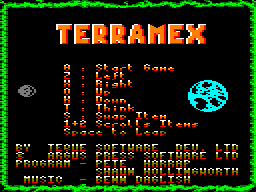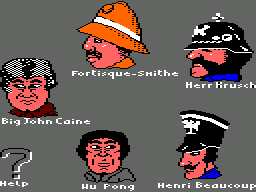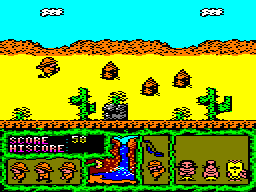Terramex for Amstrad CPC
Amstrad CPCGame controls in browser
Show Controller & SystemClick on play Amstrad CPC game now button first to start emulator and load the game. Controls:
Terramex
Online version of Terramex for Amstrad CPC. Terramex (Cosmic Relief: Prof. Renegade to the Rescue in US) is an action platform adventure game developed by Teque Software and released in 1987 for home computers. The goal is to find Professor Eistrain (Eyestrain - `eye strain`) in his secret laboratory. The professor predicted that a meteor was moving towards Earth and its course was threatened by a collision. The gameplay mainly consists of jumping over chasms, collecting a mysterious set of items and dodging many villains such as flying lizards, giant water droplets, and tentacles that appear unexpectedly from under the rocks. Progress is hindered by various puzzles, which are usually solved by choosing the correct items from those available...
Game details
Other platforms online 1
You can play Terramex online also in a versions for72%
rating (2 users voted)
Amstrad CPC Computers
Online emulated version of Terramex was originally developed for the Amstrad CPC (Colour Personal Computer), a series of 8-bit home computers produced by Amstrad between 1984 and 1990. It was designed to compete in the mid-1980s home computer market dominated by the Commodore 64 and the Sinclair ZX Spectrum in Europe. The series spawned a total of six distinct models: The CPC464, CPC664, and CPC6128 were highly successful competitors in the European home computer market. The later 464plus and 6128plus, intended to prolong the system's lifecycle with hardware updates, were considerably less successful, as was the attempt to repackage the plus hardware into a game console as the GX4000.
The CPC models' hardware is based on the Zilog Z80A CPU, complemented with either 64 or 128 KB of RAM. Their computer-in-a-keyboard design prominently features
an integrated storage device, either a compact cassette deck or 3 inch floppy disk drive. The main units were only sold bundled with either a colour,
green-screen or monochrome monitor that doubles as the main unit's power supply. Three built-in display resolutions are available:
160×200 pixels with 16 colours, 320×200 pixels with 4 colours, and 640×200 pixels with 2 colours.
The CPC uses the General Instrument AY-3-8912 sound chip, providing three channels, each configurable to generate square waves, white noise or both.
Additionally, a wide range of first and third-party hardware extensions such as external disk drives, printers, and memory extensions, was available.



